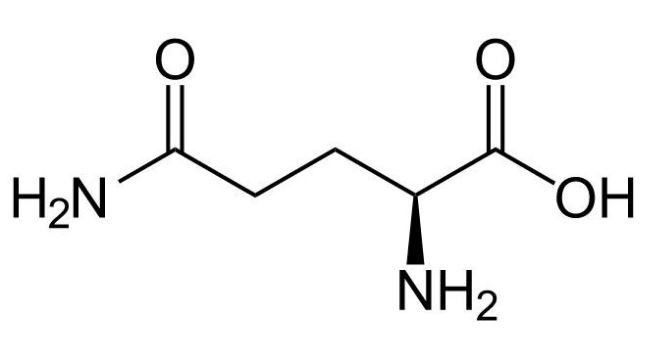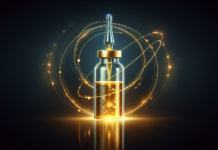What is glutamine?
Glutamine or L-glutamine is the most abundant amino acid in the blood and muscles. It plays a role in protein synthesis, immune protection, maintenance of intestinal wall integrity and acid-base balance in the body. It is also used to produce endogenous glucosamine, which in turn helps repair cartilage and tendons.

Glutamine is not considered an essential amino acid because the body is able to synthesize it from various foods according to its needs. Moderate exercise, practiced regularly, increases the level of glutamine in the blood, but extreme stress can significantly reduce it1 (severe burns, severe trauma, surgery, etc.). The body can then become the target of several infections. This seems to be the case, for example, of what is known as “overtraining syndrome”.
It is a form of exhaustion and weakening of the immune system that affects athletes after, for example, a marathon or any other activity that is particularly demanding in terms of physical endurance. After very intense exercise, muscle reserves of glutamine decrease. If the recovery time is insufficient to restore them, a deficiency can occur, making the athlete more vulnerable to infection.
Immune damage occurs when the body’s ability to rebuild and resist stress is exceeded. Thus, during intense exercise or rigorous training, the production of free radicals increases. This overload leads to an exhaustion of antioxidants produced by the body, such as glutathione, for example. Normally, rest and food replenish antioxidant enzyme stores. Therefore, while a regular exercise program generally leads to an increase in immune defenses, overtraining can lead to exhaustion.
Several factors can aggravate this exhaustion. The first on the list is the individual’s overall level of stress. For example, symptoms of overtraining may appear in a person who is on a relatively light exercise program but is experiencing significant stress in daily life. Symptoms of overtraining are frequent colds, unexplained fatigue, or even less restful sleep. They are contrary to the improvement in vitality that one would expect from an exercise program.
Glutamine dosage
Overtraining Syndrome Prevention
Although the results of studies do not always agree, in trials, taking 5 to 10 g of glutamine before or immediately after intense exertion helped prevent a decrease in immune defenses.
Food Sources of Glutamine
Meat, fish, dairy products, cereals, and legumes are good sources of glutamine. Raw spinach, parsley, and miso also contain it.
It is estimated that in our modern societies, a normal diet provides 5 to 10 g of glutamine per day.
Glutamine Deficiency
Although the body normally produces all the glutamine it needs, a deficiency can occur during extreme physiological stress caused by a serious accident, severe burns, surgery, severe illness, etc. In such cases, the immune resistance can be damaged, as well as the integrity of the intestinal wall, which can lead to the appearance of several infections. It has also been observed that over-training can cause glutamine deficiency.
History of Glutamine
In the mid-1950s, the results of two animal trials and a preliminary clinical trial indicated that glutamine might help alcoholics overcome their desire to drink.
In the 1980s, preliminary studies reported that glutamine could prevent neurodegenerative disorders and modulate mood. This route also appears to have been abandoned by researchers, although glutamine is in fact the precursor to neurotransmitters called glutamate.
During the 1990s, glutamine supplementation was shown to help patients with severe trauma. At that time, they began to be added to preparations for enteral and parenteral feeding of hospitalized patients, including intensive care patients.
During the same decade, glutamine was attributed with ergogenic properties (improved physical performance) and several glutamine-based products for athletes and bodybuilders appeared on the market.
Glutamine Research
In conventional medicine, glutamine is added to the enteral or parenteral diet of patients admitted to intensive care, or who have undergone trauma or severe surgery, to reduce the risk of infection associated with glutamine deficiency.
Please note that the research listed below refers only to oral glutamine intake.
The results of a placebo study with 151 athletes who required intense and sustained exertion indicate that use of glutamine (5 g immediately after exertion and 5 g, 2 h later) may reduce the risk of infection in the following days. But the role and influence of blood glutamine levels in the immune system after intense exercise have not yet been determined, because the results of studies do not always coincide.
A substance is said to be ergogenic if it improves muscle work and, as a result, physical performance. From a theoretical point of view, glutamine can be considered an ergogenic substance. However, clinical trials to date have not produced conclusive results. The only positive trial used a mixture of creatine (another substance with ergogenic effects) and glutamine, which does not allow the observed effect to be attributed solely to glutamine.
Medical use
Cachexia is the result of loss of appetite and nutrient absorption disorders caused by treatments for AIDS or cancer, for example. According to studies with AIDS patients and cancer patients under treatment , glutamine combined with antioxidants or other amino acids may reduce weight loss. This type of treatment has also been helpful for people whose cachexia was caused by rheumatoid arthritis.
In several studies, a glutamine supplement has been shown to reduce afta stomatitis (inflammation of the mouth with mouth ulcers) caused by chemotherapy.
Researchers are also interested in the protective effect of glutamine against nerve damage (neuropathy) caused by chemotherapy: promising results have been obtained in some preliminary trials.
Chemotherapy and radiotherapy can cause diarrhea. Glutamine gave mixed results in this area.
Interactions
With plants or supplements: None
With medication: Theoretically, taking a glutamine supplement may counteract the effect of anti-epileptics (anticonvulsants).
On the shelves
Glutamine is marketed in HGH boosting capsules or tablets such as Growth Factor Plus, Genf20 Plus, Genfx, Serovital, HGH X2 and Hypergh 14x, as well as in powder form (slightly soluble) to mix with a little liquid before consumption. It is also added to some protein supplements.



